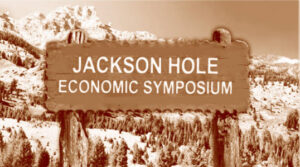Worries about the Chinese economic decline and higher rates and pressure it creates in the financial sector left markets little changed on Friday in a very choppy session. However, the short-term oversold condition suggests a relief rally to challenge overhead resistance could begin at any time. Uncertainty and price volatility are likely as we wait on the Fed speakers and talking head marketeering coming our way later this week from Jackson Hole.
Asian markets finished the day mixed after China cut their 1-year prime rate but surprisingly left the 5-year rate unchanged as their real estate crisis continues to expand. European markets trade higher across the board this morning as investors look to relieve some of last week’s selloff. U.S. market ahead of a light day of earnings and economic reports also point to some bullish relief with futures suggesting a gap up open though substantial overhead resistance awaits the challenge.
Economic Calendar


Earnings Calendar

Notable reports for Monday include FN, NDSN & ZM.
News & Technicals’
China has lowered its one-year loan prime rate (LPR) by 10 basis points to ease the financing costs for businesses and households amid the economic slowdown caused by the coronavirus pandemic. The one-year LPR, which is the benchmark for most consumer and corporate loans in China, was reduced from 3.55% to 3.45%, according to the announcement by the People’s Bank of China on Monday. However, this cut was smaller than the 15 basis points that most economists had expected, according to a Reuters poll. On the other hand, China kept its five-year LPR, which is the reference for most mortgages, unchanged at 4.2%, despite the market anticipation of a 15-basis point reduction. This suggests that China is still cautious about stimulating the housing market, which has shown signs of recovery in recent months.
A former regional manager of Starbucks has won a legal victory against the coffee giant, after claiming that she was discriminated against because of her race. Shannon Phillips, who is white, sued Starbucks for wrongful termination, alleging that she was fired in 2018 for opposing the company’s policy of punishing white employees more harshly than Black employees following the controversial arrests of two Black men at a Philadelphia store. Phillips said that she was singled out and treated differently from other managers who were not white. In April, a jury awarded Phillips more than $25 million in damages for lost earnings and emotional distress. On Friday, a judge ordered Starbucks to pay an additional $2.7 million in lost wages and tax damages to Phillips, bringing the total amount to nearly $28 million. Starbucks said that it was disappointed with the verdict and planned to appeal.
The U.S. Treasury market saw a rise in yields on Monday, as investors prepared for a busy week of economic data and speeches from Federal Reserve officials. The yield on the 10-year Treasury note, which moves inversely to its price, climbed 4 basis points to 1.62%, while the yield on the 30-year Treasury bond rose 3 basis points to 2.32%. The higher yields reflected the expectations of stronger economic growth and inflation in the U.S., as well as the uncertainty about the Fed’s monetary policy stance. Investors were looking forward to hearing from Fed Chair Jerome Powell and other Fed policymakers, who were scheduled to speak at various events throughout the week. They were also awaiting the release of key economic reports, such as the consumer price index, retail sales, and industrial production, which could provide more clues about the state of the U.S. economy and the outlook for interest rates.
The S&P 500 ended the week with little change on Friday, but it was still down for the third week in a row due to worries about China and rising interest rates. The Nasdaq, which is more sensitive to interest rates, also suffered from the high level of the 10-year Treasury yield, which dropped slightly Friday but stayed close to its highest point in 11 years. Global markets also fell, as investors were concerned about the troubles in China’s property sector. The months of August and September tend to be more challenging for stocks, with bigger swings and deeper corrections but the short-term oversold condition now suggests a relief rally could begin at any anytime. With very little on earnings and an economic calendar expect volatility as we wait for all the talking head speeches from Jackson Hole later in the week.
Trade Wisely,
Doug








Comments are closed.